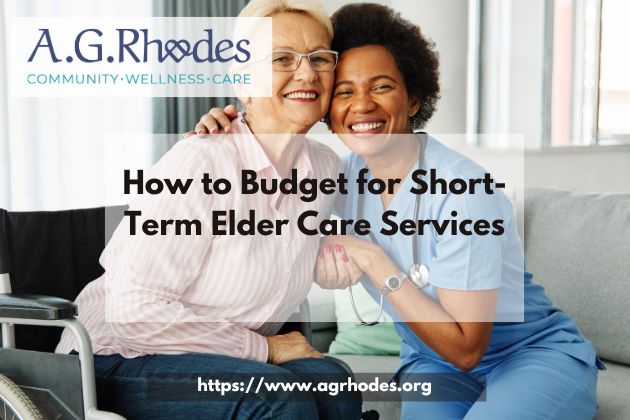Providing quality short-term elder care is a crucial aspect of planning for a loved one’s health and recovery. Whether it’s following a hospital stay, managing rehabilitation needs, or offering respite for a primary caregiver, short-term elder care services are essential. However, many families find themselves uncertain about the costs and how to prepare financially. Understanding the different types of services, pricing models, and available funding options is key to ensuring your loved one receives the best care without compromising your financial stability.
Understanding Short-Term Elder Care Services

Short-term elder care typically includes:
- Post-hospital rehabilitation
- Respite care for family caregivers
- Transitional care between home and long-term facilities
- Short recovery stays after surgery or illness
These services may be offered in skilled nursing facilities, assisted living communities, or in-home care settings. Duration can range from a few days to several weeks, depending on the individual’s health condition and goals.
Common Cost Factors in Short-Term Elder Care
Several variables affect the cost of short-term care, such as:
1. Type of Facility and Level of Care
- Skilled Nursing Facilities (SNFs): Offer 24/7 medical care, physical therapy, wound care, medication management, and more.
- Assisted Living Communities: Provide personal assistance, meals, and light medical oversight, but typically not intensive rehab.
- In-Home Care: May involve visiting nurses, aides, or therapists, depending on the care plan.
2. Length of Stay
Costs are often calculated on a per-day or per-week basis. A longer stay may qualify for discounted rates, especially if booked as a package.
3. Care Needs and Services
More complex medical needs (like onsite dialysis, memory care, or physical therapy) significantly increase the cost. Specialized staff and medical equipment also contribute to higher pricing.
4. Room Type and Amenities
Private rooms, enhanced dining options, wellness programs, or premium amenities may be optional—but often worth the added cost for comfort and recovery speed.
Average Costs of Short-Term Elder Care in Georgia
In Georgia, the average senior costs based on CarePatrol are:
- Private Room in Nursing Home – $297 per day, $8,365 per month
- Assisted Living Facility – $118 per day, $3,535 per month
- Home Health Aide -$171 per day, $5,148 per month
These are estimates. Actual rates vary based on facility, individual care plans, services offered, and other factors.
Planning Your Budget for Short-Term Elder Care
1. Determine Care Objectives
Identify the primary goal: Is it recovery from surgery? Respite for a caregiver? Transitional care?
This determines the level and type of care needed, helping you avoid overpaying for unnecessary services.
2. Request a Comprehensive Care Plan
Reputable providers should offer a detailed breakdown of services and costs. Ask about:
- Nursing care
- Therapy sessions
- Medications
- Meals and nutrition
- Social and wellness activities
- Any additional or “a la carte” charges
3. Compare Local Providers
Use online reviews, referrals, and in-person tours to compare quality and pricing. Check if facilities offer:
- Bundled rates
- Discounted weekly pricing
- Sliding scale fees based on income
4. Explore Payment Options
Medicare
Covers short-term care in a skilled nursing facility if:
- The individual had a qualifying hospital stay (minimum 3 days)
- A doctor certifies the need for skilled nursing or rehab
- The care begins within 30 days of the hospital discharge
Medicare may cover up to 20 days in full and partial coverage up to 100 days.
Medicaid
For eligible low-income seniors, Medicaid may cover longer-term stays in a nursing facility, including some short-term care in certain cases.
Private Insurance
Check the terms of long-term care insurance or health insurance policies for short-term care provisions, which may include in-home or facility-based services.
Veterans’ Benefits
VA programs often cover respite and rehab care for veterans, particularly those with a service-connected disability or limited income.
Out-of-Pocket and Private Pay
If you’re paying without insurance or government aid, prioritize transparency in pricing and request written agreements for services.
Cost-Saving Tips for Short-Term Elder Care
- Bundle services (therapy, meals, care) to avoid separate charges.
- Inquire about seasonal promotions or first-time stay discounts.
- Opt for semi-private rooms if having a private roomisn’t a critical concern.
- Use care coordinators or senior advisors for assistance in navigating programs.
- Monitor the care plan weekly to ensure services align with goals and no unnecessary add-ons are billed.
Prioritize Quality, Compassion, and Transparency
Choosing short-term elder care is both a medical decision and a financial one. The best outcomes happen when families combine proactive budgeting with trusted providers who prioritize dignity, recovery, and personalized care.
A.G. Rhodes: Affordable, High-Quality Short-Term Elder Care in Atlanta
At A.G. Rhodes, we offer short-term care solutions rooted in clinical excellence and genuine compassion. Whether your loved one needs rehabilitation, skilled nursing, or onsite dialysis, our team works with you to build a clear, affordable care plan that supports recovery and well-being, without hidden fees.
Our communities in Atlanta are designed with comfort and safety in mind, and our staff is always available to guide you through your financial options.
Contact us today to speak with a care coordinator, schedule a tour, or explore how we can support your family’s short-term care needs with confidence and compassion.

